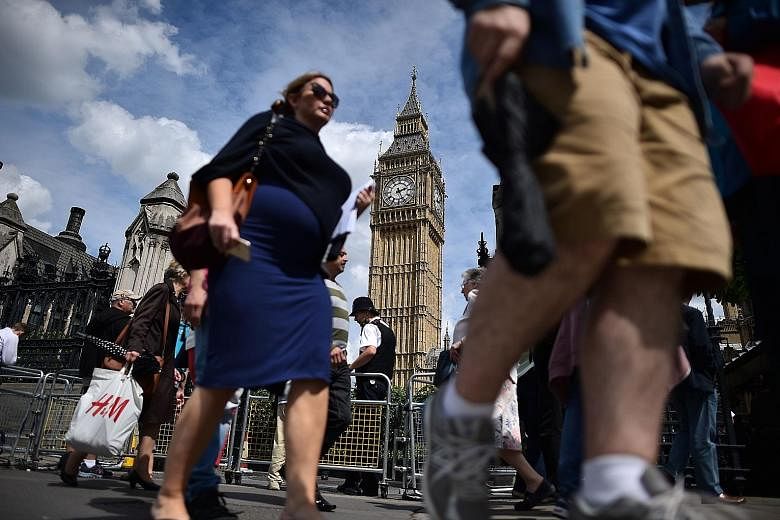WASHINGTON • The uncertainty created by Britain's vote to leave the European Union will slow the global economy into next year, the International Monetary Fund (IMF) predicted yesterday.
Cutting its World Economic Outlook forecasts for the fifth time in 15 months, the IMF said that it now expects global GDP to grow at 3.1 per cent in 2016 and at 3.4 per cent in 2017 - down 0.1 percentage point for each year from estimates issued in April.
The fund said that despite recent improvements in Japan and Europe and a partial recovery in commodity prices, the United Kingdom's Brexit vote had created a "sizeable increase in uncertainty"that would take its toll on investment and market and consumer confidence.
Britain's relations with the 28-member EU single market were thrown into confusion following the June 23 vote, raising the possibility of sudden, new trade barriers and at least initially causing a sell-off in global financial markets.
Analysts have predicted this will weigh on consumption and investor confidence.
On the day before the referendum, the IMF was "prepared to upgrade our 2016-17 global growth projections slightly", IMF chief economist Maury Obstfeld said in a statement. "But Brexit has thrown a spanner in the works."
The IMF said that the impact will hit hardest in Britain itself, where the institution cut its 2016 growth forecast to 1.7 per cent, down 0.2 percentage points from its April forecast. It cut the 2017 UK forecast more sharply, by 0.9 percentage points, to 1.3 per cent. The IMF lifted its euro zone forecast slightly for 2016, but cut its 2017 outlook by 0.2 percentage point to 1.4 per cent.
It noted that its latest forecasts were made under relatively benign assumptions of a settlement between the EU and Britain that leads to limited political fallout, avoids a major rise in economic barriers and prompts no major further financial market disruptions.
Brexit's consequences for the United States were likely to be "muted", with growth steady at 1.8 per cent this year and next, representing a downward revision of 0.2 per cent this year.
However, the IMF warned of possibly greater risks for global growth. Non-performing loans and the poor profitability of Greek, Italian and Portuguese banks as well as enduring market turbulence were among factors that "could have severe macroeconomic repercussions", according to the Fund.
While the short-term prospects for the Chinese economy were unchanged or even improved due to interventions by the central authorities - driving this year's forecast up 0.1 to 6.6 per cent - the heavy reliance on credit to drive growth could create instability.
The recent appreciation of the yen is likely to counteract an announced two-year delay in hiking a consumption tax in Japan. This has slowed the forecast growth in the country's already anemic economy, with the IMF revising it downward to just 0.3 per cent, to be followed by a bare 0.1 per cent growth next year.
AGENCE FRANCE-PRESSE, REUTERS

